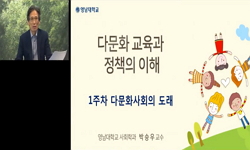This study aims to analyse the Ministry of Education's multicultural education policy, anchored in the typologies of multiculturalism proposed by Jenks, Lee & Kanpol. From 2006 to 2022, the research examined the types and objectives of the initiatives...
http://chineseinput.net/에서 pinyin(병음)방식으로 중국어를 변환할 수 있습니다.
변환된 중국어를 복사하여 사용하시면 됩니다.
- 中文 을 입력하시려면 zhongwen을 입력하시고 space를누르시면됩니다.
- 北京 을 입력하시려면 beijing을 입력하시고 space를 누르시면 됩니다.

다문화교육 정책의 다문화주의 유형 분석(2006-2022) = Analysis of Types of Multiculturalism in Multicultural Education Policy(2006-2022)
한글로보기https://www.riss.kr/link?id=A108912545
- 저자
- 발행기관
- 학술지명
- 권호사항
-
발행연도
2023
-
작성언어
Korean
- 주제어
-
등재정보
KCI등재
-
자료형태
학술저널
-
수록면
25-45(21쪽)
- DOI식별코드
- 제공처
-
0
상세조회 -
0
다운로드
부가정보
다국어 초록 (Multilingual Abstract)
This study aims to analyse the Ministry of Education's multicultural education policy, anchored in the typologies of multiculturalism proposed by Jenks, Lee & Kanpol. From 2006 to 2022, the research examined the types and objectives of the initiatives announced by the Ministry of Education to support multicultural education. The research was based on the types of multiculturalism (conservative multiculturalism, liberal multiculturalism, critical multiculturalism) presented by Jenks, Lee & Kanpol (2001).
The findings revealed First, South Korea's multicultural education policies were predominantly characterised by Conservative Multiculturalism. However, there has been a notable decline in such Conservative initiatives across governments, with a corresponding increase in Liberal and Critical Multiculturalism efforts. Second, across all governments, initiatives aimed at students were predominantly of a Conservative Multiculturalism persuasion. Thirdly, projects that focused on multicultural students emphasised access to public education, school adaptation, Korean language education and academic support. In contrast, initiatives targeting the wider student population tended to focus on promoting an understanding of multiculturalism.
Several implications emerge from this research: First, there is an urgent need for South Korea's future multicultural education policies to emphasize the role of Critical Multiculturalism. Secondly, there is a need for increased focus on both liberal and critical multiculturalism in multicultural education policies aimed at students.
Finally, in addition to facilitating multicultural students' access to public education and supporting their school adjustment, there is an urgent need to expand emotional support initiatives
동일학술지(권/호) 다른 논문
-
- 인하대학교 교육연구소
- 김상무
- 2023
- KCI등재
-
사회계층과 관련된 진로발달 연구동향 분석 : 키워드네트워크 분석을 중심으로
- 인하대학교 교육연구소
- 김영화
- 2023
- KCI등재
-
생애 전환기 중년학습자의 평생학습 경험에 대한 질적 메타분석
- 인하대학교 교육연구소
- 이윤진
- 2023
- KCI등재
-
잠재프로파일 분석을 통한 청소년의 사회적 약자 인식 유형 분류 및 유형별 입시에서의 사회적 약자 우대정책 태도 연구
- 인하대학교 교육연구소
- 김다혁
- 2023
- KCI등재




 KCI
KCI KISS
KISS


